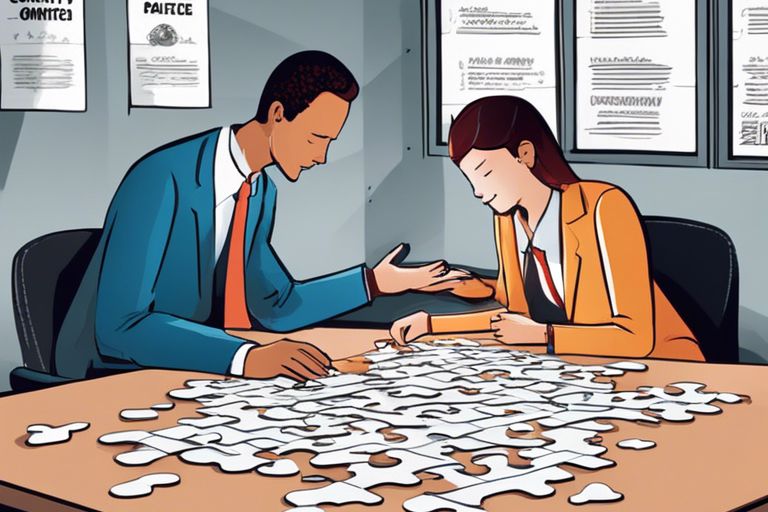Acquiring effective conflict resolution skills is crucial for navigating interpersonal relationships, both personally and professionally. In this blog post, you will discover the best methods to develop and enhance these essential abilities. Whether you are looking to mediate disputes, manage workplace conflicts, or simply improve communication in relationships, these strategies will help you foster a more harmonious environment.
Identifying Conflict Resolution Styles
The first step in developing effective conflict resolution skills is to identify your conflict resolution style. Understanding your default approach to handling conflicts can help you better navigate challenging situations and adapt your communication and problem-solving strategies accordingly.
Competing
The competing style of conflict resolution is characterized by a strong focus on achieving your own goals at the expense of others. When using this style, you assert your own position and pursue your objectives aggressively, often neglecting the needs and concerns of others. This approach can be effective in situations that require quick decision-making or when you need to stand up for your rights, but it can also lead to strained relationships and resentment from others.
Collaborating
In the collaborating style, you strive to find a solution that satisfies the needs and concerns of all parties involved. This approach involves open communication, active listening, and a willingness to explore different perspectives. By focusing on cooperation and mutual understanding, you can work towards creating win-win solutions and building stronger relationships. However, collaborating may require more time and effort compared to other styles.
Compromising
When employing the compromising style, you seek to find a middle ground that partially meets the needs of all parties involved. This approach involves making concessions and finding a solution that offers a reasonable level of satisfaction for everyone. While compromise can help resolve conflicts efficiently, it may also lead to unresolved issues and lingering dissatisfaction.
Avoiding
Using the avoiding style, you choose to sidestep or postpone the conflict rather than addressing it directly. This approach can be effective in situations where emotions are running high or when further discussion is unlikely to lead to a resolution. However, consistently avoiding conflicts can lead to unresolved tensions and unmet needs, potentially exacerbating the situation in the long run.
Accommodating
Employing the accommodating style involves putting the needs and concerns of others before your own. This approach can be beneficial in preserving relationships and showing empathy towards others. However, consistently accommodating others may result in your own needs being overlooked and could lead to feelings of frustration and unmet expectations.
Essential Conflict Resolution Skills
However, conflict resolution skills are essential for maintaining healthy relationships, both personally and professionally. Developing effective conflict resolution skills can help you navigate challenging situations and find positive outcomes. Below are some essential skills that you should focus on improving.
Active Listening
One of the most important conflict resolution skills is active listening. This involves fully concentrating, understanding, responding, and remembering what is being said. By practicing active listening, you can demonstrate empathy and show the other person that you value their perspective. Improving your active listening skills can help prevent conflicts from escalating and facilitate effective resolution. For more tips on improving your active listening skills, check out 3 Tips to Improve Conflict Resolution Skills.
Emotional Intelligence
Emotional intelligence plays a crucial role in conflict resolution. Understanding and managing your own emotions, as well as recognizing and empathizing with the emotions of others, can help you navigate conflicts more effectively. By developing your emotional intelligence, you can approach conflicts with a greater sense of self-awareness and empathy, leading to more positive outcomes.
Effective Communication
Effective communication is vital for resolving conflicts. Clear and assertive communication can help you express your thoughts and feelings while also understanding the perspectives of others. By improving your communication skills, you can minimize misunderstandings and facilitate productive discussions, leading to better conflict resolution.
Problem-Solving and Negotiation
When it comes to conflict resolution, problem-solving and negotiation skills are essential. Being able to identify underlying issues, explore potential solutions, and negotiate compromises can help you reach mutually beneficial resolutions. Developing strong problem-solving and negotiation skills can empower you to address conflicts collaboratively and effectively.
Implementing Conflict Resolution Strategies
To develop effective conflict resolution skills, it is vital to understand how to implement various strategies in different scenarios. By applying these strategies, you can effectively resolve conflicts and maintain healthy relationships. To learn more about conflict resolution skills, you can refer to this resource on Conflict Resolution Skills.
Establishing Ground Rules
When it comes to resolving conflicts, establishing ground rules is essential. This involves setting clear guidelines and expectations for communication and behavior during the conflict resolution process. By setting ground rules, you create a structured and respectful environment that promotes open and honest dialogue, ultimately leading to a more productive resolution.
Developing a Structured Approach
Having a structured approach to conflict resolution involves following a step-by-step process that allows for thorough communication and problem-solving. By having a structured approach, you can ensure that all parties involved have the opportunity to express their concerns and work together towards a solution.
Fostering a Collaborative Environment
Creating a collaborative environment is crucial for effective conflict resolution. This involves promoting a sense of teamwork and cooperation among all parties involved. By fostering a collaborative environment, you can encourage individuals to actively participate in finding mutually beneficial solutions, rather than resorting to adversarial tactics.
Seeking External Mediation or Support
In some cases, conflicts may require external mediation or support from a neutral third party. This can be particularly helpful when emotions are running high, and communication between the parties has broken down. Seeking external mediation or support can provide a fresh perspective and help facilitate a more constructive dialogue, ultimately leading to a resolution.
Practice and Reflection
Now that you have learned about the top conflict resolution strategies for the workplace, it’s time to put them into practice. One of the most effective ways to develop your conflict resolution skills is through practice and reflection. This involves actively engaging in conflict resolution scenarios and reflecting on your experiences to identify areas for improvement. By doing so, you will be able to refine your skills and become more adept at managing workplace conflicts. For more information on conflict resolution strategies, you can refer to The Top 5 Conflict Resolution Strategies for the Workplace for further insights.
Role-Playing Scenarios
One effective way to practice conflict resolution skills is through role-playing scenarios. You can simulate workplace conflicts with a colleague or mentor, taking turns in playing different roles. This allows you to practice applying various conflict resolution strategies and tactics in a controlled environment. By engaging in role-playing scenarios, you can gain valuable experience and confidence in addressing conflicts effectively.
Reflective Practice and Learning from Past Conflicts
Another essential aspect of developing effective conflict resolution skills is through reflective practice. Take the time to reflect on past conflicts you have encountered in the workplace. Identify the strategies and approaches that worked well, as well as those that may have been less effective. By analyzing your past experiences, you can gain valuable insights and learn from your mistakes. This self-reflection will enable you to continually improve and refine your conflict resolution skills.
Continuous Improvement and Adaptation
Conflict resolution is an ongoing process that requires continuous improvement and adaptation. As you practice and reflect on your experiences, you should be open to adapting your approach based on the specific dynamics of each conflict. It’s important to remain flexible and open-minded, as different situations may require different strategies. By continuously refining and adapting your conflict resolution skills, you will be better equipped to handle various workplace conflicts effectively.




1 Comment
I was looking at some of your posts on this internet site and I conceive
this web site is really informative! Keep posting.Money from blog